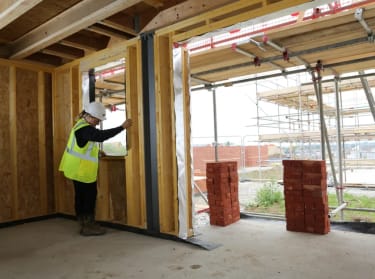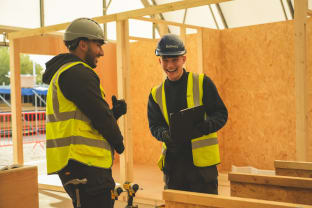
Timber Modern Methods of Construction (MMC) is a type of construction process that has gained popularity in recent years due to its sustainability, efficiency, and cost-effectiveness. Timber MMC involves using engineered wood products and prefabricated components to construct buildings. Compared to masonry construction, Timber MMC has been found to outperform by five tonnes of CO2 equivalent per dwelling.
We know that Timber Modern Methods of Construction (MMC) outperforms masonry by 5tonnes of CO2 equivalent per dwelling. But what is that equivalent to in road miles?
Poll was carried out across NHBC social channels in April 2023. Results have been collated and presented below.
The answer is C, 16,500 road miles!

So why is Timber MMC more sustainable?
Materials
Timber is a renewable resource - it can be replaced by planting new trees - the production of bricks and concrete used in masonry construction is energy-intensive and generates carbon emissions. Cement production alone accounts for about 8% of global carbon emissions, making it a significant contributor to climate change.
Off-site prefabrication
Timber MMC is prefabricated off-site which reduces the amount of on-site construction waste generated, which further reduces the environmental impact of the construction process. This limits the amount of waste sent to landfill while also minimising the amount of energy and water needed to construct a building. In contrast, masonry construction completed on-site can be time-consuming and requires more energy and water.
Thermal properties
Engineered wood products used in Timber MMC have excellent thermal properties, which can help reduce energy consumption in buildings. Wood has a lower thermal conductivity than masonry, so it takes longer for heat to transfer through wood than through masonry. This makes Timber MMC buildings more energy-efficient, requiring less heating and cooling than masonry buildings.
Flexibility
Timber is more flexible than masonry, allowing for greater customisation of the building design. It can also be easily adapted over time to meet changing needs, reducing the need for demolition and reconstruction. Masonry construction, on the other hand, can be rigid and inflexible, making it difficult to modify or adapt.
Summary
Timber MMC outperforms masonry by five tonnes of CO2 equivalent per dwelling due to its sustainability, efficiency, cost-effectiveness, and adaptability. By using renewable resources, reducing waste, being energy-efficient, flexible, and long-lasting, Timber MMC provides a more sustainable solution to construction than masonry. As we strive to reduce our carbon footprint and mitigate climate change, Timber MMC provides an excellent alternative to traditional masonry construction.
Latest articles

Skills for Life: It all starts with an apprenticeship

What’s really beneath your land? Why early insight is your best defence against risk

How apprenticeships can help close the construction skills gap
